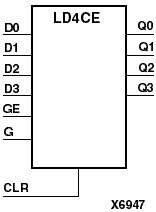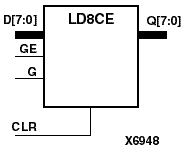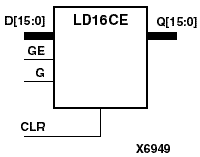|
|
|
|
|
|
| XC3000 | XC4000E | XC4000X | XC5200 | XC9000 | Spartan | SpartanXL | Spartan2 | Virtex |
|---|---|---|---|---|---|---|---|---|
| N/A | N/A | Macro | Macro | N/A | N/A | Macro | Macro | Macro |



LD4CE, LD8CE, and LD16CE have, respectively, 4, 8, and 16 transparent data latches with asynchronous clear and gate enable. When the asynchronous clear input (CLR) is High, it overrides the other inputs and resets the data (Q) outputs Low. Q reflects the data (D) inputs while the gate (G) input is High, gate enable (GE) is High, and CLR is Low. If GE for is Low, data on D cannot be latched. The data on the D input during the High-to-Low gate transition is stored in the latch. The data on the Q output remains unchanged as long as GE remains Low.
The latch is asynchronously cleared with Low output when power is applied. FPGAs simulate power-on when global reset (GR) or global set/reset (GSR) is active. GR (XC5200) and GSR (XC4000, Spartans, Virtex) default to active-High but can be inverted by adding an inverter in front of the GR/GSR input of the STARTUP, STARTUP_SPARTAN2, or STARTUP_VIRTEX symbol.
| Inputs | Outputs | |||
|---|---|---|---|---|
| CLR | GE | G | Dn | Qn |
| 1 | X | X | X | 0 |
| 0 | 0 | X | X | No Chg |
| 0 | 1 | 1 | 1 | 1 |
| 0 | 1 | 1 | 0 | 0 |
| 0 | 1 | 0 | X | No Chg |
| 0 | 1 | Dn | dn | |
| Dn = referenced input, for example, D0, D1, D2 Qn = referenced output, for example, Q0, Q1, Q2 dn = referenced input state, one setup time prior to High-to-Low gate transition | ||||